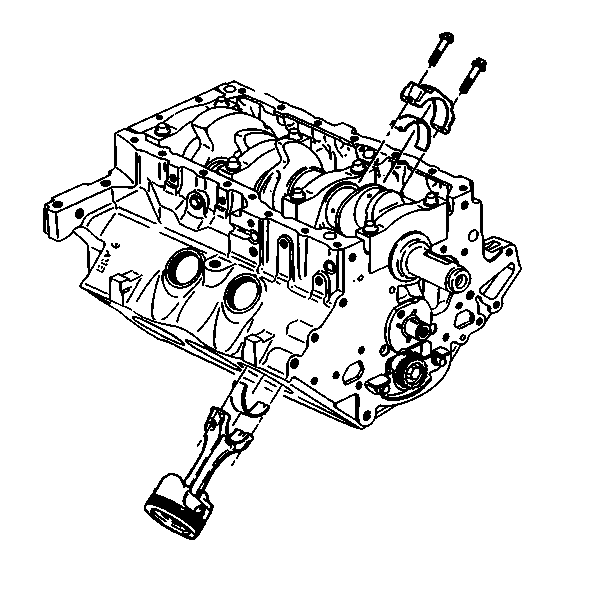Removal Procedure
- Disconnect the negative battery cable. Refer to
Caution: Unless directed otherwise, the ignition and start switch must be in the OFF or LOCK position, and all electrical loads must be OFF before servicing any electrical component. Disconnect the negative battery cable to prevent an electrical spark should a tool or equipment come in contact with an exposed electrical terminal. Failure to follow these precautions may result in personal injury and/or damage to the vehicle or its components.
in General Information. - Remove the cylinder head. Refer to Cylinder Head Replacement .
- Remove the oil level sensor. Refer to Oil Level Sensor .
- Remove the oil pan. Refer to Oil Pan Replacement .
- Remove the oil pump pipe and screen. Refer to Oil Pump Suction Pipe and Screen Assembly Replacement .
- Mark the connecting rod cap and rod for proper reassembly.
- Remove the connecting rod bolts.
- Remove the connecting rod cap.
- Remove the piston and connecting rod assembly.
Important: In order to avoid damage to the piston ring lands, be sure to remove any carbon or ridge at the top of the cylinder bore.

Installation Procedure
Tools Required
| • | J 36660-A Torque Angle Meter |
| • | J 8037 Piston Ring Compressor |
| • | J 41507 Connecting Rod Guide |
- Install the piston rings to the piston. In order to provide an effective compression seal, stagger the ring gaps.
- Turn the crankshaft to bottom dead center.
- Lubricate the cylinder with oil.
- Install the connecting rod bearing.
- Install the piston and the connecting rod assembly with the ridges toward the front of the engine. Use the J 8037 .
- Raise the vehicle. Suitably support the vehicle. Refer to Section 0A.
- Use the J 41507 in order to guide the connecting rod through the cylinder.
- Install the connecting rod cap.
- Install the connecting rod cap bolts.
- Install the oil pump pipe and screen assembly. Refer to Oil Pump Suction Pipe and Screen Assembly Replacement .
- Install the oil pan. Refer to Oil Pan Replacement .
- Install the oil level sensor. Refer to Oil Level Sensor .
- Install the cylinder head. Refer to Cylinder Head Replacement .
- Connect the negative battery cable.

Notice: Guide the lower connecting rod end carefully to avoid damaging the crankshaft journal.
Notice: This bolt is designed to permanently stretch when tightened, and therefore MUST be replaced anytime it is removed. The correct part number fastener must be used to replace this type of fastener. Do not use a bolt that is stronger in this application. If the correct bolt is not used, the parts will not be tightened correctly. The system or the components may be damaged.
Tighten
Tighten the bolts to 27 N·m (20 lb ft). Use
the J 36660-A
in order to rotate the bolts
an additional 50°.
Notice: Use the correct fastener in the correct location. Replacement fasteners must be the correct part number for that application. Fasteners requiring replacement or fasteners requiring the use of thread locking compound or sealant are identified in the service procedure. Do not use paints, lubricants, or corrosion inhibitors on fasteners or fastener joint surfaces unless specified. These coatings affect fastener torque and joint clamping force and may damage the fastener. Use the correct tightening sequence and specifications when installing fasteners in order to avoid damage to parts and systems.
